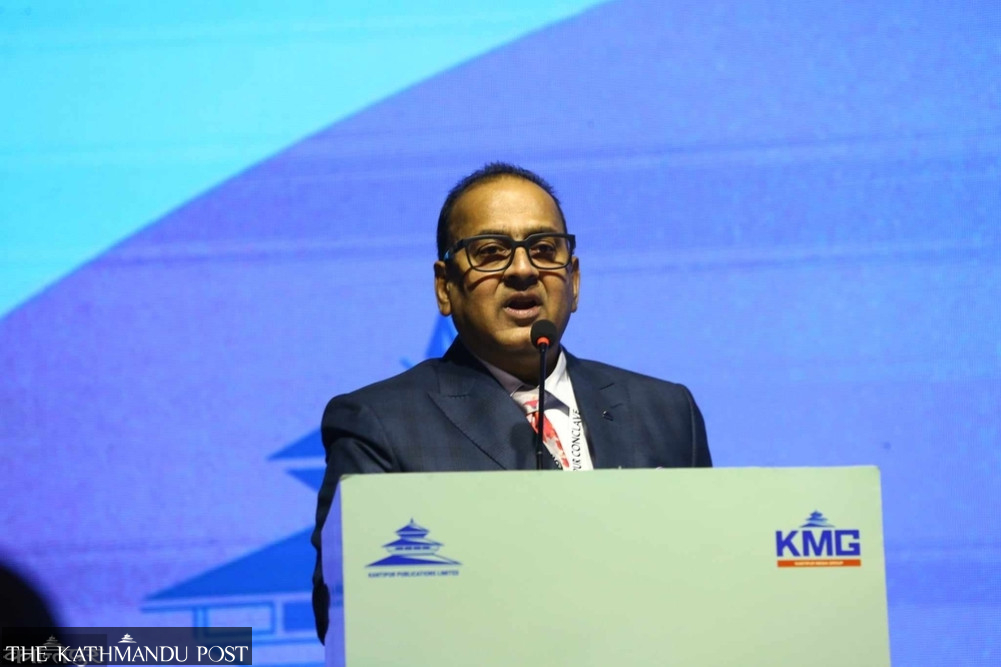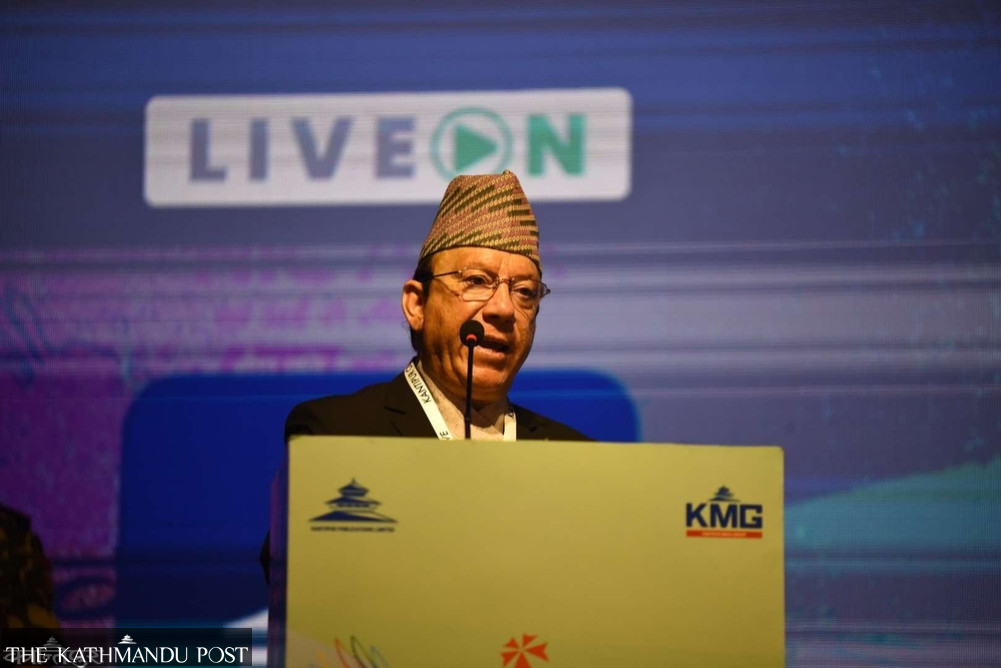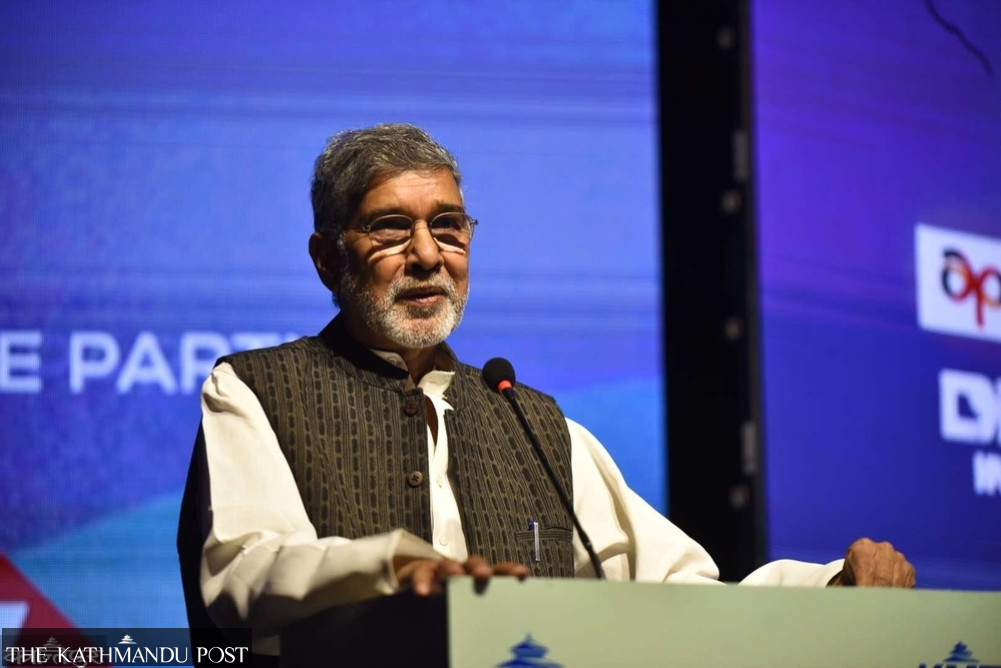National
Kantipur Conclave 2024 kicks off
Chief Justice Prakash Man Singh Raut underscores judiciary as foundation of democracy.
Post Report
The fourth edition of Kantipur Conclave kicked off at Hyatt Regency in Kathmandu on Wednesday.
The main theme of this year’s conclave, organised by the Kantipur Media Group and where national and international issues are discussed, is ‘Democracy in Dilemma.’
The conclave, in which NIC Asia Bank is the main sponsor and Asian Paints is a co-sponsor, will feature 12 sessions with 55 speakers, including ten international speakers. Nobel Peace Prize laureate Kailash Satyarthi from India will deliver the keynote speech.
Prime Minister KP Sharma Oli, former Prime Minister Pushpa Kamal Dahal, and Chief Justice Prakash Man Singh Raut will participate as speakers in the conclave. Raut will deliver an opening remarks.
Former Chief Election Commissioner of India Dr. S.Y. Quraishi, Indian Political Scientist Pratap Bhanu Mehta, Director of the South Asia Institute at the Wilson Center, USA Michael Kugelman, Wang Peng Research Fellow from the Institute of State Governance, Huangzong University of science and technology, China, Diplomatic Affairs Editor at The Hindu Suhasini Haidar, Indian political activist Yogendra Yadav, British author and journalist Thomas Bell, and American journalist Peter Gill among others will participate in various sessions.
On Wednesday, the first day of the conclave, discussions will cover six topics: ‘Democracy at a Crossroads,’ ‘Policy and Prosperity,’ ‘The Wave of Populism,’ ‘Social Media: A Double-Edged Sword,’ ‘Pen and Power: Three Decades of Nepalese Democracy and Journalism,’ and ‘Path of Prachanda: Street or State?’
On Thursday, the second day, sessions will include ‘Electoral Reform: Policy or Practice?’, ‘Geopolitical Turbulence,’ ‘Women Champions from the Field,’ ‘Prosperity Beyond Borders,’ ‘Key Concerns of Chief Ministers, ’ and ‘In Conversation with the Prime Minister.’
Delivering a welcome speech at the event, KMG Chairman Kailash Sirohiya said the conclave would unite leaders, visionaries, and changemakers from Nepal and across the globe.

“It is a space for transformative dialogue where innovative ideas are exchanged and turned into actionable solutions. We focus on innovation governance and the future of democracy, and we are committed to fostering an environment where meaningful discussion can inspire political changes,” he said.
“This year’s theme, democracy and dilemma, is particularly relevant as more than half of the world’s population will vote this year. This election will shape global and regional political landscapes from India to the United States, Russia to France, and across the United Kingdom, Africa, and Latin America.”
Delivering his opening remarks, Chief Justice Prakash Man Singh Raut underscored the judiciary as the foundation of democracy, stating that reforms require leadership marked by purity, integrity, and commitment.
He asserted that judicial independence must remain intact, and any compromise or interference with judicial dignity is unacceptable.
Raut stressed that reforms within the judiciary, like those in other sectors, are essential to counter disillusionment.

“Reforms in the judiciary are also imperative,” he said. “It is only through these reforms that we can overcome public discontent.” He highlighted that these reforms demand strong leadership and a dedicated commitment to integrity and purity. “If each sector undergoes improvement, prosperity will naturally follow, illuminating and beautifying the nation,” he said.
The chief justice also called for necessary reforms in the media, questioning whether journalism had misused its influence, and urged that its power be used wisely and in a timely manner. “The most valuable asset is time,” he said. “If we fail to recognise its importance, we will pay a heavy price.”
Raut said that the judiciary’s independence is crucial to democracy, noting that democracy’s strength lies in its ability to convey consensus and embrace even serious disagreements and differences of opinion.
Delivering a keynote speech at the conclave, Nobel Peace Prize laureate Kailash Satyarthi highlighted the erosion of public trust in governance due to issues like corruption, lack of transparency, accountability, advancing majoritarianism, and polarisation.
He expressed concern over the politicisation and compromise of democratic pillars such as the judiciary and media, stating that when these institutions serve political interests rather than justice, public confidence in democracy is undermined.
Satyarthi noted that, as a result, people are beginning to question the value of democracy itself.

Satyarthi warned that powerful groups are manipulating social media to create a flood of false information, which confuses the public and drives societal division. “The misuse of social media fuels hatred and revenge. It is contributing to an unprecedented level of global fragmentation not seen in decades.”
Satyarthi further said there is a shift towards authoritarianism in decision-making across institutions, political parties, and even personal life, undermining democratic values of shared power and decentralised decision-making. He stressed that this erosion weakens democracy at its core.
He said that the failure of state institutions to ensure social justice is also causing the weakening of democracy. “If people do not feel secure in their future or confident in equal opportunities in society, they lose faith in democracy,” he said.
Satyarthi said social justice is essential for democracy to thrive, ‘as it gives citizens a stake in a fair and equitable society.’




 9.89°C Kathmandu
9.89°C Kathmandu













